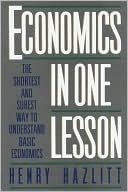More on this book
Community
Kindle Notes & Highlights
Supply creates demand because at bottom it is demand. The supply of the thing they make is all that people have, in fact, to offer in exchange for the things they want. In this sense the farmers’ supply of wheat constitutes their demand for automobiles and other goods.
Steve Spinks and 1 other person liked this
THERE IS NO more persistent and influential faith in the world today than the faith in government spending.
Tim and 1 other person liked this
The world is full of so-called economists who in turn are full of schemes for getting something for nothing.
Steve Spinks and 1 other person liked this
Therefore, for every public job created by the bridge project a private job has been destroyed somewhere else.
Tim and 1 other person liked this
GOVERNMENT “ENCOURAGEMENT” TO business is sometimes as much to be feared as government hostility.
Steve Spinks liked this
All credit is debt. Proposals for an increased volume of credit, therefore, are merely another name for proposals for an increased burden of debt. They would seem considerably less inviting if they were habitually referred to by the second name instead of by the first.
Steve Spinks liked this
This is only another way of saying that the government lenders will take risks with other people’s money (the taxpayers’) that private lenders will not take with their own money.
Government-guaranteed home mortgages, especially when a negligible down payment or no down payment whatever is required, inevitably mean more bad loans than otherwise. They force the general taxpayer to subsidize the bad risks and to defray the losses. They encourage people to “buy” houses that they cannot really afford. They tend eventually to bring about an oversupply of houses as compared with other things.
When the government makes loans or subsidies to business, what it does is to tax successful private business in order to support unsuccessful private business.
When your money is taken by a thief, you get nothing in return. When your money is taken through taxes to support needless bureaucrats, precisely the same situation exists.
Nothing is easier to achieve than full employment, once it is divorced from the goal of full production and taken as an end in itself.
SPECIAL INTERESTS, as the history of tariffs reminds us, can think of the most ingenious reasons why they should be the objects of special solicitude.
Paradoxical as it may seem to some, it is just as necessary to the health of a dynamic economy that dying industries be allowed to die as that growing industries be allowed to grow. The first process is essential to the second.
THE WHOLE ARGUMENT of this book may be summed up in the statement that in studying the effects of any given economic proposal we must trace not merely the immediate results but the results in the long run, not merely the primary consequences but the secondary consequences, and not merely the effects on some special group but the effects on everyone.
they are solved by a system under which each consumer makes his own demand and casts a fresh vote, or a dozen fresh votes, every day; whereas bureaucrats would try to solve it by having made for the consumers, not what the consumers themselves wanted, but what the bureaucrats decided was good for them.
We cannot distribute more wealth than is created.
In an exchange economy everybody’s money income is somebody else’s cost.
If we try to run the economy for the benefit of a single group or class, we shall injure or destroy all groups, including the members of the very class for whose benefit we have been trying to run it. We must run the economy for everybody.
No bureaucrat, no matter how brilliant, can solve this problem arbitrarily. Free prices and free profits will maximize production and relieve shortages quicker than any other system.
Deficit spending, once embarked upon, creates powerful vested interests which demand its continuance under all conditions.
ECONOMICS, as we have now seen again and again, is a science of recognizing secondary consequences.
It is also a science of seeing general consequences. It is the science of tracing the effects of some proposed or existing policy not only on some special interest in the short run, but on the general interest in the long run.
When they say that the way to economic salvation is to increase credit, it is just as if they said that the way to economic salvation is to increase debt: these are different names for the same thing seen from opposite sides.
“What is prudence in the conduct of every private family,” said Adam Smith’s strong common sense in reply to the sophists of his time, “can scarce be folly in that of a great kingdom.” But lesser men get lost in complications. They do not reexamine their reasoning even when they emerge with conclusions that are palpably absurd.
It is C, the Forgotten Man, who is always called upon to stanch the politician’s bleeding heart by paying for his vicarious generosity.
For many things that seem to be true when we concentrate on a single economic group are seen to be illusions when the interests of everyone, as consumer no less than as producer, are considered.
The American Social Security system must stand today as a frightening symbol of the almost inevitable tendency of any national relief, redistribution, or “insurance” scheme, once established, to run completely out of control.
In brief, the main problem we face today is not economic, but political.


